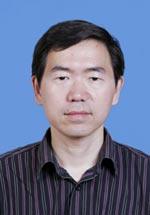|
 |
| ?張明權(quán) |
本期點(diǎn)評(píng)專(zhuān)家:張明權(quán)
譯題一:騰訊、360混戰(zhàn) 勿拿網(wǎng)民利益當(dāng)棋子
參考譯文:
Clashes between QQ and 360 emaciate the interest of subscribers
Clashes between Tencent QQ and Qihoo 360 in China are, overtly or covertly, hampering the interest of users at large, for neither of the two companies is a respecter of customers. What’s worse, subscribers are reduced to initiators and objects of slurs and denigration. Owing to the fierce contention substantialised as reviling and undermining each other, users put in a dilemma are now denied the services available to them of running both applications at one computer. Whether one company laughs the last or two smile at each other in the end, a common user will laugh out of the other side of his mouth.
在上面的文字中,使用了隱喻和四字格成語(yǔ),這往往也成為譯者關(guān)注的焦點(diǎn),“水上客”的譯文順著原文的文脈,采用直譯和意譯結(jié)合的方式處理原文的意象,比如把“明槍暗箭”翻譯成overt and covert attacks,“口誅筆伐的棋子和依據(jù)”翻譯成tools and proofs in the course of denouncing each other by tongue and pen,“恩仇繼續(xù)”翻譯成,continues revenge,“相逢一笑”翻譯成make peace,“哭笑不得”翻譯成in a distressing situation,反映了譯者追求“零度翻譯”的理想,這往往也是大多數(shù)譯者第一選擇的翻譯策略。然而,翻譯偏離又是在所難免的,這也是翻譯理論界關(guān)注的一個(gè)問(wèn)題,有人不斷地和翻譯偏離做斗爭(zhēng),有人則視偏離為常態(tài),常常能出其不意的“擇其善者而從之”,并借助補(bǔ)償措施,譯出好的文字。
我們繼續(xù)就上述要點(diǎn)以及“混戰(zhàn)”、“腹背受敵”、“火藥味”等幾個(gè)地方進(jìn)行分析。首先,“混戰(zhàn)”眾多網(wǎng)友翻譯成dogfight,然而選擇這樣一個(gè)貶義詞來(lái)描述兩家互聯(lián)網(wǎng)公司的爭(zhēng)斗畢竟有些不妥,倒是sunariose使用的catfight和“藍(lán)咪咪”的battle royal更加妥當(dāng)。“棋子”一詞有網(wǎng)友直譯為chess,這是個(gè)錯(cuò)誤,“棋子”是chessmen,有人寫(xiě)過(guò)這樣的句子:they used live chessmen who fight for live princesses. 這里可以看出chessmen倒是一個(gè)可以被英語(yǔ)接受的隱喻意象。回到“口誅筆伐”一詞,“水上客”的直譯策略并未得到其他網(wǎng)友的呼應(yīng),jasmine-I大大簡(jiǎn)化了原文,翻譯出了:Worse still, they became the stake。至于“腹背受敵”,yieqing直譯為contained back and belly,不過(guò)在英語(yǔ)中back and belly作為習(xí)語(yǔ)的隱喻意義是“衣食”。至于“火藥味”,“藍(lán)咪咪”的翻譯amidst such intensive and explosive situation試圖借助語(yǔ)義雙關(guān)來(lái)保留原文意象,也是很好的一種嘗試。
對(duì)于30多年來(lái)已習(xí)慣于“急行軍”、高速發(fā)展的中國(guó)人來(lái)說(shuō)“慢城”到底是否烏托邦?
參考譯文:
A Glimpse of the First Slow City in China
To the Chinese people who have been “marching” rapidly in the past 30 years, would a “slow city” sound like a utopia?
In November this year Yaxi Town was given the title of “slow town” by the Cittaslow International. Located in Gaochun County, Jiangsu Province in East China’s coastal area, it used to be a small town never known to the outside world. The news spreads quickly on the internet—the abrupt advent of an “international slow town”, like a U-turn on the freeway, sure awakens the Chinese people long abandoned to the “forced march” and suffering from “city diseases”.
這里首先需要明確一個(gè)專(zhuān)名和兩個(gè)術(shù)語(yǔ)的翻譯,分別是“慢城”、“城市病”以及“國(guó)際慢城組織”。“慢城”翻譯成slow city (town)都可以,可以交叉使用。“城市病”的翻譯有一些爭(zhēng)議,在網(wǎng)上能找到的翻譯有city (urban) disease, urban dilemmas, city (urban) syndrome等,這些翻譯似乎都沒(méi)什么問(wèn)題。英國(guó)經(jīng)濟(jì)在20世紀(jì)曾飽受British disease(英國(guó)病)之苦,另外有一首英文歌曲名為:city syndrome,這些可以給我們確定譯文一些幫助。“國(guó)際慢城組織”的英語(yǔ)譯名在網(wǎng)上可以查到:Cittaslow International。
“急行軍”是一個(gè)比喻,在文中兩次出現(xiàn),基本上對(duì)應(yīng)著英語(yǔ)的forced march,根據(jù)英語(yǔ)篇章的寫(xiě)作要求,在兩個(gè)地方的處理略有不同。“號(hào)稱(chēng)中國(guó)首個(gè)‘國(guó)際慢城’的橫空出現(xiàn),宛如高速公路上的一個(gè)掉頭標(biāo)志般。”這句話(huà)翻譯起來(lái)有些困難,特別是“橫空出現(xiàn)”一詞,頗得漢語(yǔ)喜歡夸張之真?zhèn)鳎诜g的時(shí)候可以play down(放低身段)一點(diǎn)沒(méi)關(guān)系,所以筆者翻譯成了abrupt advent,“宛如高速公路上的一個(gè)掉頭標(biāo)志般”直譯成like a U-turn on the freeway,需要后面的動(dòng)詞給與配合,筆者把開(kāi)始用來(lái)翻譯“震撼和矚目”的動(dòng)詞(使用了轉(zhuǎn)類(lèi)的翻譯技巧)astounds and fascinates換成了awakens,這樣前后才協(xié)調(diào),這也是翻譯偏離的一個(gè)重要表現(xiàn),但同時(shí)這種局部偏離在整體上是得到補(bǔ)償?shù)模w現(xiàn)了其中的辯證關(guān)系。
譯題三:近年底白領(lǐng)工作壓力大 豪放派解壓玩具走俏
參考譯文:
When the year comes to an end, white collars take to “wild” stress relief toys
When you fling an unbreakable “bulb” again and again to the ground, you are somewhat relieved from grudges; a sticker on the table saying “work drives me drowsy” unexpectedly refreshes you from tiredness…when finally confronted with the year’s goals and checks, white collars turn to interesting stress relief toys to get relaxation and refreshment.
Pressures come, especially at the end of a year, to a climax to the mentally hassled white collars facing fierce competition at work, says a professional training expert. After all, “mild” bookmarks, “wild” toys, etc. are available for a catharsis and relief of pressure at this critical moment. However, it is suggested that they not be used in a public place.
本文在敘述上是針對(duì)“白領(lǐng)”的第三人稱(chēng)敘事,但根據(jù)我們對(duì)此類(lèi)英語(yǔ)文字的認(rèn)識(shí),泛指代you或者we也是經(jīng)常用到的代詞,用you代替one可以拉近與讀者的距離。在本文的翻譯中,一些細(xì)節(jié)問(wèn)題很有意思,比如“豪放派”與“溫和”的對(duì)立與對(duì)稱(chēng),英語(yǔ)剛好有mild和wild這樣兩個(gè)諧音(assonance)的單詞可用。“印著”(或者“寫(xiě)著”)通常可以翻譯成擬人的say一詞,“悄悄”這個(gè)詞的意思在筆者的翻譯中轉(zhuǎn)移到了后面的unexpectedly這個(gè)詞上,這也可以算翻譯偏離的一個(gè)例證,所以偏離不是錯(cuò)誤,是一種技巧。對(duì)于“各類(lèi)”這樣的詞匯,如果沒(méi)有特殊需要的話(huà),翻譯成英語(yǔ)時(shí)可以使其語(yǔ)義融入名詞的復(fù)數(shù)形式中。在“職業(yè)專(zhuān)家”一詞的翻譯上,問(wèn)題不是翻譯成professional (training) expert,還是翻譯成career expert,而是用單數(shù)還是復(fù)數(shù)的問(wèn)題,在英語(yǔ)新聞中,引用某人的觀(guān)點(diǎn),需要具體說(shuō)出這個(gè)被采訪(fǎng)的對(duì)象,所以我覺(jué)得這里用單數(shù)比較好,否則真是總說(shuō)紛紜了。最后一句,“使用這類(lèi)‘解壓商品’一定要注意場(chǎng)合,盡可能避免辦公場(chǎng)所。”包含了相互重復(fù)的內(nèi)容,翻譯時(shí)可以省去。我們看一個(gè)網(wǎng)友的翻譯:Please keep them away from public, and use them in proper places de rigueur. 從實(shí)際情況來(lái)看,只要不是公共場(chǎng)合,就是私人場(chǎng)所,所以合不合適的標(biāo)準(zhǔn)就是在不在公共場(chǎng)合使用。
最后想說(shuō)幾句題外話(huà),感謝各位網(wǎng)友提供譯文,筆者在點(diǎn)評(píng)時(shí),掛一漏萬(wàn),不當(dāng)之處還請(qǐng)不吝指正;再者,參考譯文也僅供參考,但筆者堅(jiān)持自己翻譯,部分有參照網(wǎng)友譯文的地方一般會(huì)給與指出,偶然會(huì)有未盡指出的地方,歡迎網(wǎng)友監(jiān)督指出。
本文僅代表作者本人觀(guān)點(diǎn),與本網(wǎng)立場(chǎng)無(wú)關(guān)。歡迎大家討論學(xué)術(shù)問(wèn)題,尊重他人,禁止人身攻擊和發(fā)布一切違反國(guó)家現(xiàn)行法律法規(guī)的內(nèi)容。
更多文章
范式與翻譯
翻譯中的融會(huì)貫通
翻譯過(guò)程中不得已的舍棄
英譯漢 真的譯成漢語(yǔ)了嗎?
翻譯中的增詞與減詞
翻譯中的勘誤與隱喻“取舍”
專(zhuān)家簡(jiǎn)介:
張明權(quán),安徽省固鎮(zhèn)縣人,江蘇大學(xué)外國(guó)語(yǔ)學(xué)院副教授,英語(yǔ)語(yǔ)言文學(xué)碩士,上外博士課程班進(jìn)修。主要從事英語(yǔ)語(yǔ)言學(xué)和翻譯學(xué)研究,在國(guó)內(nèi)外學(xué)術(shù)期刊發(fā)表論文10余篇,出版譯著兩部,發(fā)表其他文章20余篇,有大量翻譯實(shí)踐經(jīng)驗(yàn),翻譯總字?jǐn)?shù)接近200萬(wàn)。Email: mqzhang@ujs.edu.cn。
(作者:張明權(quán) 中國(guó)日?qǐng)?bào)網(wǎng)英語(yǔ)點(diǎn)津 編輯:Julie)
